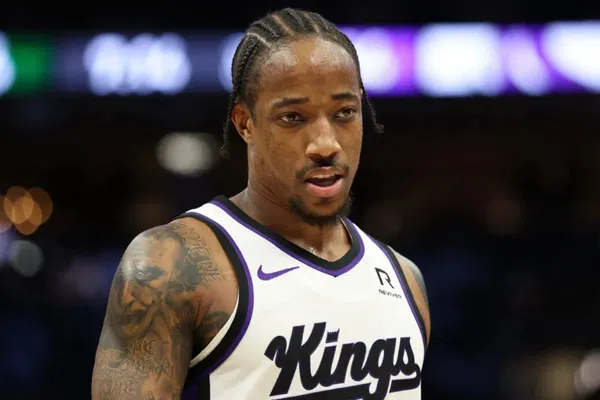A fascinating narrative is currently unfolding in the basketball world, one that goes beyond the box scores and highlights, delving into the very foundation of what it means to be an elite player in the modern NBA. The focus of this story is DeMar DeRozan, a player who has consistently carved his own path, defying the prevailing trends of a league obsessed with the three-point shot. His recent comments, surfacing from a podcast interview, have ignited a conversation that touches on some of the most revered names in basketball history: Kobe Bryant and Allen Iverson. The “truth” about DeMar DeRozan, as it has been framed, is not about a sudden change in his game, but a deeper revelation about his philosophical approach to the sport, one that has been shaped by his own unique experiences and a steadfast loyalty to the fundamentals he believes in.
For years, DeMar DeRozan has been lauded, and at times criticized, for a game built around the mid-range jumper. In an era where efficiency is king and analytics have pushed players to either shoot at the rim or beyond the arc, DeRozan has been a defiant anachronism, a master of a shot that many consider a dying art. This deliberate choice, his commitment to a style of play that mirrors some of the game’s greatest, is at the heart of the recent discussions. He has openly spoken about his reverence for Kobe Bryant, the iconic Laker whom he idolized growing up in Compton. The connection between the two is well-documented; Bryant was not just an idol but a mentor, a figure who saw a kindred spirit in the young DeRozan and imparted his wisdom. This relationship, built on a shared passion for the intricacies of the game and a relentless work ethic, has been a central pillar of DeRozan’s basketball identity. He has, on multiple occasions, credited Bryant with providing the “imagination and foundation” for his game, teaching him the importance of footwork, the fadeaway, and the mental toughness that defines a champion. The “Mamba Mentality,” a phrase that has become synonymous with Kobe, was not just an ideal for DeRozan, but a practical lesson learned through training sessions and conversations that have stayed with him throughout his career.
However, the recent comments that have garnered so much attention suggest a nuanced evolution in DeRozan’s perspective. While he holds an enduring respect for Kobe, and his game still bears the hallmarks of that tutelage, he has also made a statement that, on the surface, seems to separate him from that legacy. The “truth” that has surfaced is not a rejection of Kobe, but a deeper, more personal reflection on what truly drives him. It’s a statement that suggests his motivation and his sense of identity as a player are not solely tied to mimicking his heroes, but to a more authentic and internal source. The specific details of the podcast interview reveal a DeRozan who has found his own voice and his own truth. He’s a player who, having navigated the peaks and valleys of a long career, has come to understand that his greatest strength lies not in emulating others, but in perfecting his own craft. This is where the distinction becomes crucial. It is one thing to model your game after a legend; it is another to internalize their lessons and then forge your own distinct path, a path that is uniquely yours.
This brings us to the other name in the conversation, Allen Iverson. While Iverson and DeRozan share a similar stature as elite perimeter scorers who rely heavily on their individual skill, the comparison is also complex. Iverson’s game was defined by a fearless, attacking style, a relentless drive to the basket, and a breathtaking display of ball-handling and quickness. He was a cultural icon who challenged the status quo, and his impact on the game is undeniable. DeRozan, while also a masterful scorer, possesses a more methodical, almost classical approach. His game is less about speed and flash and more about precision, footwork, and a deep understanding of angles and spacing. So when the narrative suggests that DeRozan has “ditched” these two legends, it is not a literal abandonment, but a symbolic act of self-definition. He is not saying that their influence is gone, but rather that his own identity has superseded his desire to be seen as a successor to either.
The “truth” that has surfaced is that DeRozan is not a clone of Kobe Bryant, nor is he a modern-day Allen Iverson. He is, simply and profoundly, DeMar DeRozan. He is the product of his Compton upbringing, a world that taught him resilience and the consequences of good and bad decisions. He is a player who, in his own words, has been “built off of pain,” and who has channeled that energy into his game. This personal history, the pain and the struggle, is the authentic source of his motivation, a wellspring of drive that goes beyond any single idol or mentor. The “truth” is that his motivation comes from within, from a deep-seated desire to represent his community and to prove himself against a league that has often tried to tell him his game is outdated.
This narrative also serves as a powerful commentary on the modern NBA. DeRozan has been an outspoken critic of some of the current trends, particularly the lack of respect for the history of the game and the over-reliance on analytics. His game, a testament to the beauty of a perfectly executed mid-range jumper, is a direct challenge to the notion that all shots must be either a layup or a three. He is a living embodiment of the idea that there are multiple ways to be great, and that a player’s greatness should not be measured by their three-point percentage alone. By standing firm in his style, he is not just playing basketball; he is making a statement about the soul of the sport. His “truth” is a testament to the enduring power of skill, a reminder that the fundamentals, honed through countless hours of practice, can still triumph in a game increasingly dominated by data and percentages.
In this context, the idea of an “ex-Lakers star” is also worth deconstructing. While DeRozan did not play for the Lakers, the team of his childhood idol and the dominant force in his hometown, his connection to the Lakers’ legacy runs deep. His desire to play for them was well-known, and the disappointment of it never materializing is part of his story. This unfulfilled dream adds another layer to his narrative. He is a player who, in a sense, had to forge his own legacy away from the shadow of his heroes. He had to prove his worth on his own terms, in cities like Toronto, San Antonio, and Chicago, far from the bright lights of Los Angeles. This journey, a path of self-discovery and self-reliance, is what has ultimately led to this “truth.” He is a player who has learned to be his own hero, to find his own motivation, and to build a career that is a tribute to his own resilience, not just a reflection of those who came before him.
Ultimately, the story of DeMar DeRozan’s recent comments is not about a dramatic betrayal of his mentors. It is a story about a mature player who has come into his own, a player who has taken the lessons of his idols and blended them with his own unique experiences to create something authentic and powerful. His “truth” is a declaration of independence, a statement that his identity as a player is his own, forged in the crucible of his own life and career. It is a powerful reminder that while we may be inspired by the greats, our own journey is what ultimately defines us. His continued success, and his unwavering commitment to his style of play, serves as a testament to the idea that true greatness is not about imitation, but about finding your own voice and using it to tell your own story. The basketball world, in its constant search for the next “Jordan” or “Kobe,” often forgets that the greatest players are not carbon copies, but originals who stand on the shoulders of giants while carving out their own unique space in history. DeMar DeRozan, it seems, has done just that. He is a testament to the enduring power of a game built on skill, and a powerful reminder that the most compelling stories in sports are often the most personal.



